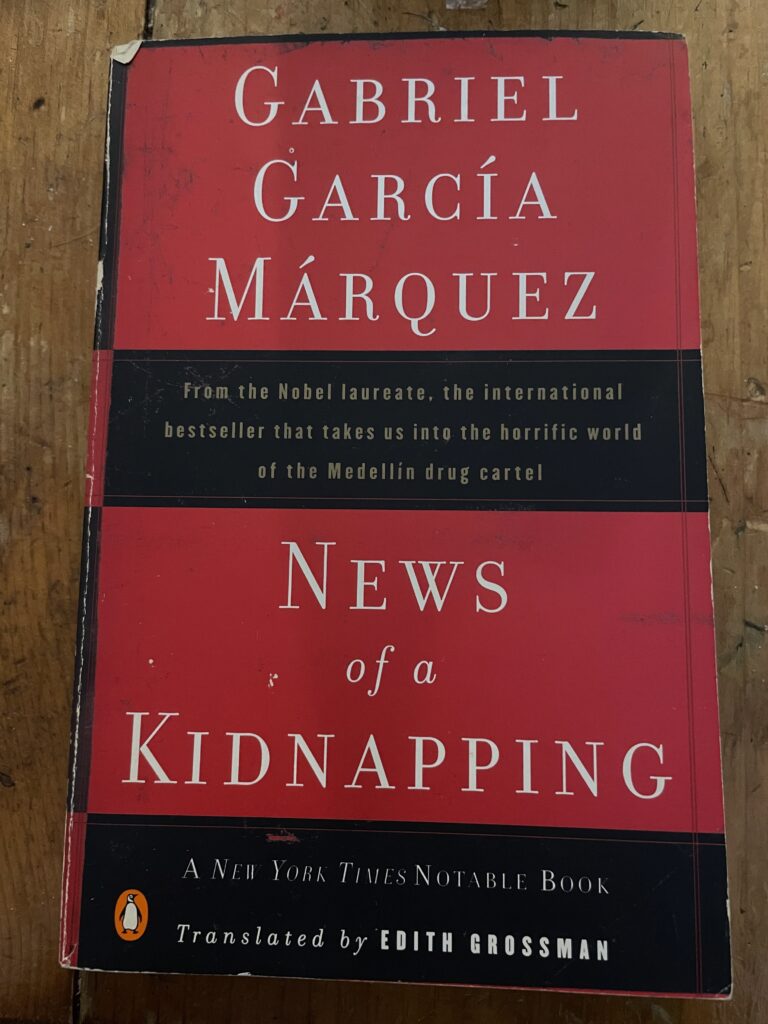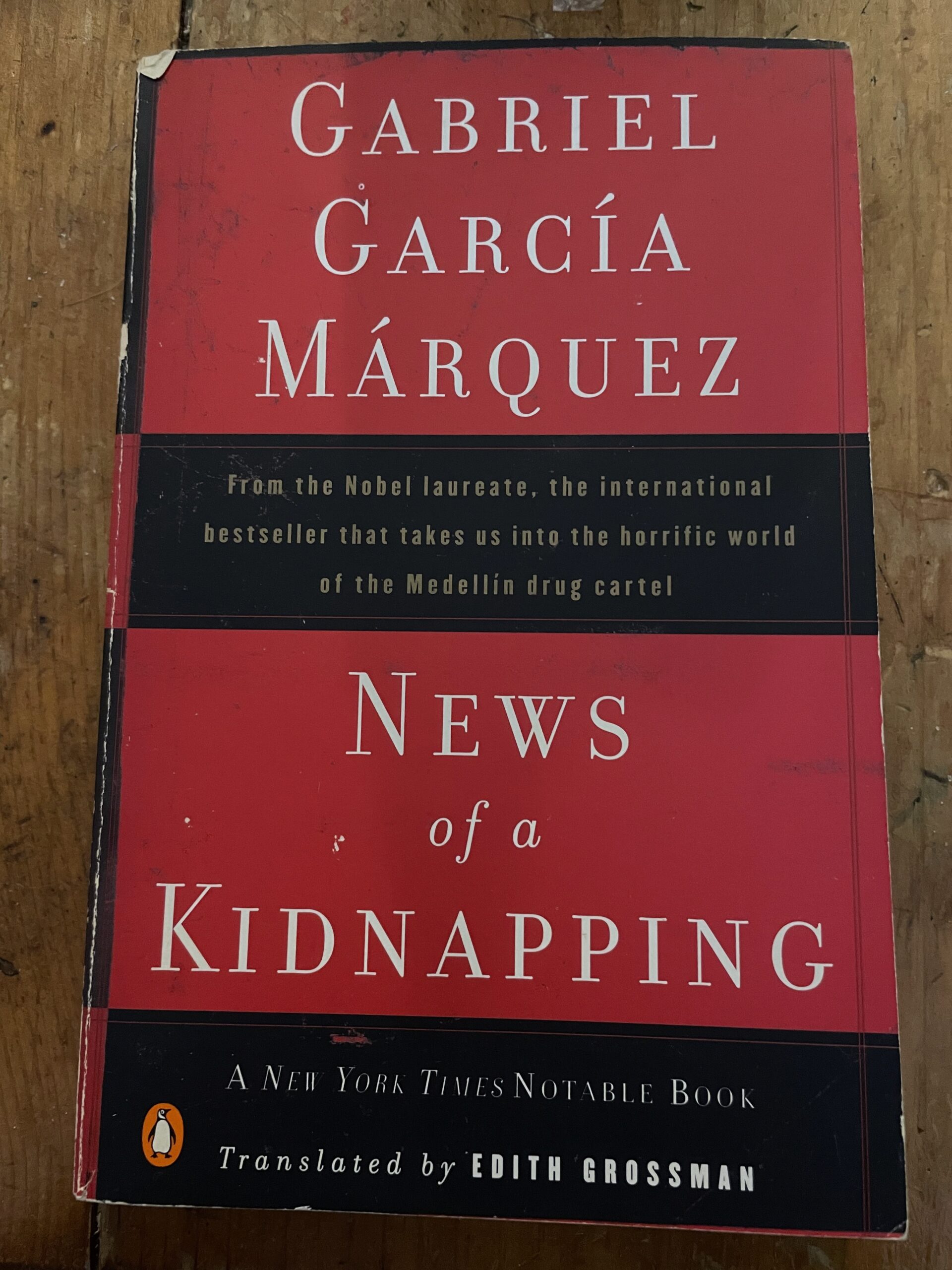“News of a kidnapping, no matter how painful, is not as irremediable as news of a murder…” – Gabriel García Márquez, ‘News Of A Kidnapping’
Like said on Wednesday, we got a great new episode of The Line Break for you, featuring Kiik Araki-Kawaguchi (Apple | Spotify | SoundCloud). Should have a Lazy & Entitled Podcast up not on Thanksgiving, but probably Tuesday or Wednesday of the next week. Then, we’ll do one December episode, kinda wrap the year up. Next week, I’ll also be posting blogs on the regular schedule, in case you are home for the holiday and bored. Very fun book next week! But next week? Is not this week. It’s a good book, but “fun” is not exactly the right word.
What I’ve Been Reading This Week:
A book that I straight-up do not remember acquiring. How did it get on my shelves? Competing theories abound. A book that was dense enough that I didn’t pair it with any poetry, but continued this blog’s streak of things being cosmically well-timed. Also, a book that I did not realize was non-fiction until I cracked it open. How could this book that I know so little about be on my shelf? Well, it’s by my second-favorite author. I’m talking, of course, about News Of A Kidnapping by Gabriel García Márquez.

Like said, I did not know this book was nonfiction. So I wasn’t expecting a drug lord narrative. Luckily, I didn’t get one. It’s interesting, reading a Colombian account of an incident involving Pablo Escobar, this larger than life figure, rather than a USian one. I could not get through season one of Narcos because I could not stand that white federal agent—you know, the bad guy in Logan and Indiana Jones and the Dial of Destiny?—I could not stand the show being from his point of view. His character is contemptuous of Colombia. Maybe I’m a little rosy about the place because I find Central America to be one of the truly beautiful places on the planet, and I have a couple of Colombian friends who speak glowingly of the place, and I read Gabo books all the time. And in Gabo books, Colombia is not some backwater full of half wits, which is how Narcos seemed to think of it. No, one Gabo’s greatest talents in on display here: the ability to make larger-than-life figures of politicians, journalists, gangsters, clergy, and most importantly, the kidnapping victims all seem accessibly human. Even in a nonfiction book, the marvelous real is present. The power of invisible forces—the zodiac, for one, and a priest’s powers of persuasion even as he’s slipping into senility, for another—is never discounted. Yet the characters, even Pablo Escobar, are extraordinarily human.
The book, in fact, focuses very little on Escobar. During the book, the Medellín Cartel kidnaps a number of people, but we spend most of our time with Maruja, her sister-in-law Beatriz, a former beauty queen named Marina, and Pacho, the editor of El Tiempo, a newspaper. We also spend a bit of time with Diana, a journalist who is the first hostage killed. Some of these people, obviously, have Wikipedia pages. I tried to imagine a USian writing about if, idk, Ammon Bundy took Michelle Obama and Laura Bush hostage for six months. That’s not a perfect analogy. The point is, we spend most of our time with these victims and the people trying to get them back, namely, Maruja’s husband and Beatriz’s brother, Alberto Villamizar. We see the ways that the women assert their dignity in captivity, we see how scared and scary their kidnappers are, we see Alberto navigating the impossible situation of negotiating with someone like Escobar. Hell, Gabo even talks a good deal about how one of Escobar’s complaints was about how Colombian police were treating people in the slums. The quickest way to get me to sympathize with someone is tell me that they’re mad about cops brutalizing poor people. Marquez has a singular talent for making everyone in his books seem like someone you could also have coffee with. I don’t say that in the George W. Bush, excuse-the-warmongering-shitheadness-because-you-could-have-a-beer-with-the-guy way. I mean that everyone, no matter their social status, feels accessible as a human being. Thus, we don’t get a drug lord narrative. We get a “goddamn, it would truly suck to be imprisoned and separated from your loved ones for any amount of time” story.
LINKS!
Something to listen to while you browse? LA LOM has a new video:
- Look, I want to be clear: ICE is not gone from Chicago. Greg Bovino and a couple hundred of his shock troops are in Charlotte, NC, right now, (Border Patrol leaders leave Chicago—for now by Shawn Mulcahy, Katie Prout and Dave Byrnes in Chicago Reader) but ICE is still here. The Signal chats I’m in are still lighting up with abductions. Things might quiet down for the winter, but they are not gone. We’re also still left tangling this bullshit in the courts, not that ICE listens to the courts. In a big piece reported by Jose Abonce, Alma Campos, Jim Daley, Andrew Fan, Francia Garcia Hernandez, Sebastián Hidalgo, Maheen Khan, Maira Khwaja, Efraín Soriano, Jonathan Torres and Wendy Wei, it’s been found that Feds Used Chemical Weapons On Chicagoans At Least 49 Times — Even After Judge Said To Stop (Block Club | South Side Weekly | Reader | The Triibe )
- From Block Club: Chicago Immigrants Struggling With Mental Health After ICE Raids: ‘They Want Us To Be Scared’ by Ariel Parrella-Aureli, Protesters Keep Getting Arrested At Broadview By State Police Despite Promise To Protect Free Speech by Mina Bloom and Charles Thrush, Little Village’s 26th Street Slowly Comes Back To Life After Months Of Immigration Raids by Molly DeVore, Mack Liederman, Mina Bloom and Colin Boyle, 400 Arrested By ICE In Chicago To Be Released Friday, But Feds’ ‘Risk’ List Remains Murky by Melody Mercado and Mick Dumke, and finally, A Midwest Bond Fund Is Helping Detained Chicago Immigrants Return To Their Families by Alex V. Hernandez. Here’s the link to that bond fund, if you can donate.
- Got a depressing ICE one, but a fun one after. First, no one could’ve seen this coming: ICE employee among 16 men arrested in Bloomington sex trafficking sting, police say by Jonah Kaplan for CBS. Okay Chicago, you earned it: here’s some happy news that’s not the art break. Dilla won an Emmy! Here’s Emmy win highlights Dilla’s quest to preserve Chicago’s Black heritage by Jerome “RomeJ” Johnson
- Thought I linked to this a while ago, but hey. Remember that incredible Sun-Times photo of the guy waving a U.S. flag while unmasked in a cloud of ICE-induced pepper spray? He’s a former marine named Curtis Evans, and Nicholas Slayton interviewed him for Task And Purpose
- For an art break this week, I really loved Good Riddance To ‘The Best American Poetry’ by Nick Sturm in Defector. Nick’s not explicit about this takeaway, but this piece is what I’ll point to as a reason to support small press poetry, to embrace politics in art, to embrace multiculturalism and conscious expanding of “the canon,” and basically, to be punk rock about your art instead of worrying about gold stars from prize committees. An exceprt, because Defector is subscription-based (but worth it!): “...The Best American Poetry is a genre management project that drives a wedge between poetry and interdisciplinary intellectual culture. It powerfully insists on defining American poetry as a literary practice self-managed by the professional networks it privileges…Poetry’s aesthetic variousness, radical discontinuities, and political efficacy are smoothed over into a marketable narrative of the genre’s ongoing resurgence in the face of difficult odds. The anthology’s profits are spent to sustain poetry’s corporate shine, legitimating Lehman’s reactionary ideology as apolitical orthodoxy…As The Best American Poetry comes to an end, a larger reactionary ideological project is asserting itself. Federal institutions supporting the arts and culture have been gutted in the name of depoliticization.“
What’re you still doing here? Don’t you know that Micah and Brendan have a show?
If you work in the service industry, may you clean up in tips this weekend. One thing that struck me in News Of A Kidnapping is how the house where the kidnappers kept Maruja and Beatriz and Marina had a majordomo. Imagine social stratification setting in so much that the house where you keep your kidnapping victim has a majordomo! I don’t know, worth interrogating who you work for, you know?
Sorry you got an email,
Chris

